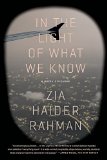Summary | Excerpt | Reviews | Beyond the Book | Readalikes | Genres & Themes | Author Bio

Like Zafar, I was a student of mathematics at Oxford, but that, to put it imprecisely, was the beginning and the end of what we had in common. Mine was a privileged background. My father was born into a well-known landed family in Pakistan, where he met and married my mother. From there, the newlyweds went to Princeton, where they had me, making me an American citizen, and where my father obtained his doctorate before moving to Oxford so that he could take up a chair in physics. I am no genius and I know that without the best English schooling, I would not have been able to make as much as I have of the opportunities that came my way.
Zafar, however, arrived at Oxford in 1987 with a peculiar education, largely cobbled together by his own efforts, having been bored, when not bullied, out of one school after another. His family moved to Britain when he was no more than five years old, but then, at the age of twelve, or ten, by the new reckoning, he returned from Britain to rural Bangladesh for an interval of some years.
To him, Oxford must have seemed, as the expression goes, a long way to come. In our first term there, as we lounged in the Junior Common Room beside windows that gave out onto the garden quad, I observed that Zafar's pronunciation of the names of various Continental mathematicians—Lebesgue, Gauss, Cauchy, Legendre, and Euler—was grotesquely inaccurate. Though my first reaction, I am a little ashamed to say, was to find this rather amusing, I soon grasped that Zafar's errors marked his learning as his own, unlike mine, which carried the imprint of excellent schoolmasters. I must confess to a certain envy at the time.
The greatest difference between us, however, the significance of which I did not begin to ascertain until two years after our first meeting, lay in our social classes. As I mentioned, my father was an academic at Oxford, and my mother, after seeing off her only child to university, had returned to practicing as a psychotherapist, throwing herself into the retraining necessary to make up ground lost while raising me. My maternal grandfather had been Pakistan's ambassador to the United States and had moved in that country's elite internationalist circles; his closest friend had been Mohammad Asad, Pakistani ambassador to the UN shortly after 1947, a man who had begun life as Leopold Weiss, an Austro-Hungarian Jew born in what is now Ukraine. On the paternal side, my grandfather was an industrialist whose fortune, based on landholdings and tenancies, he augmented with the profits of shipping enterprises.
More than once during term time, Zafar came with me to lunch at my parents' home, a large double-fronted, three-story Victorian house like many in that part of Oxford, though somewhat more capacious than the homes of most academics. To this day, whenever I return there, I feel an ease and lightness suffuse my being as I tread across the sweeping arc of the driveway, the gravel crunching underfoot, up to the stained glass of the wide front door.
On his first visit, Zafar stood at the threshold, wiping his feet over and over, his eyes darting about the large hall, his mouth slightly open. Evidently, he was, as people often are, astonished by the books, which were everywhere: shelves hanging wherever a wall would allow, books overflowing onto the floors, even leaning accordion-like on the staircase along the wall. In the family room, old issues of science magazines and journals, my father's subscriptions, sat in box files on shelves that scored the walls like lines on a writing pad. More recent issues lay about in small piles on a sideboard and on the floor. Zafar surveyed all this, but his eyes settled on the far wall that was covered with my father's collection of old maps, mounted and framed, of the Indian subcontinent under the British Raj, an area that today stretches from Pakistan across India to Bangladesh. Zafar drew up to the maps and it was apparent that his focus had fixed on one in particular, a map of the northeast corner of the subcontinent. Minutes passed as he stood silently gazing at it. Only when the time came to move to the summer room for lunch, and my father rested his hand on Zafar's shoulder, was my friend roused from his intense study.
Excerpted from In the Light of What We Know by Zia Haider Rahman. Copyright © 2014 by Zia Haider Rahman. Excerpted by permission of Farrar, Straus & Giroux. All rights reserved. No part of this excerpt may be reproduced or reprinted without permission in writing from the publisher.
The moment we persuade a child, any child, to cross that threshold into a library, we've changed their lives ...
Click Here to find out who said this, as well as discovering other famous literary quotes!
Your guide toexceptional books
BookBrowse seeks out and recommends the best in contemporary fiction and nonfiction—books that not only engage and entertain but also deepen our understanding of ourselves and the world around us.